Movie Review – Anna (2019)
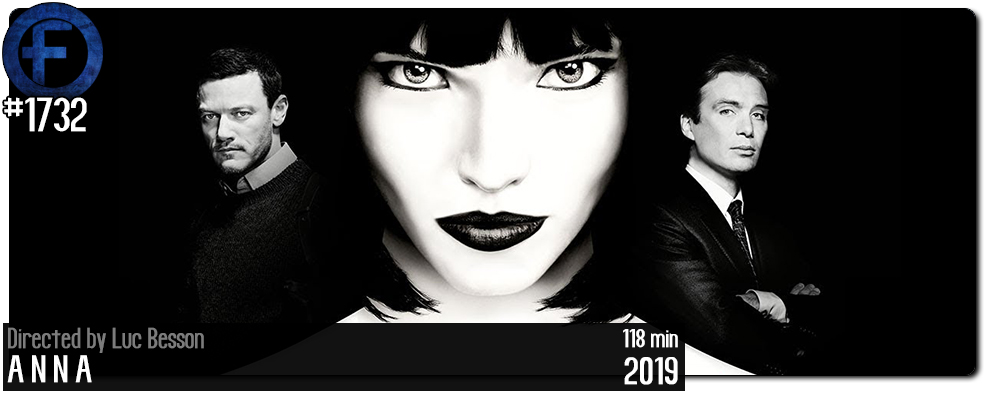
Principal Cast : Sasha Luss, Helen Mirren, Luke Evans, Cillian Murphy, Lera Abova, Alexander Petrov, Nikita Pavlenko, Anna Krippa, Aleksey Maslodudov, Eric Godon, Ivan Franek, Jean-Baptiste Puech.
Synopsis: Beneath Anna Poliatova’s striking beauty lies a secret that will unleash her indelible strength and skill to become one of the world’s most feared government assassins.
********
French director Luc Besson returns to the genre for which he’s most closely identified – the Female Assassin Film – and delivers a routine, generic knockoff of his own, far superior works, most notable Nikita and Leon: The Professional. That’s not to say Anna is without merit, but it’s becoming increasingly obvious that the usually super-slick and stylish Besson has lost much of the unique charm and vibrant style of his earlier career, with mere blips on the radar like Valerian forming a minor upsurge in interest in the filmmaker. It’s fair to say he hasn’t directly made a decent film since The Fifth Element, despite dipping a toe into animation (the Arthur series are well made kids films, but hardly memorable), whilst recent fare such as The Family and Lucy met with disdain and ruthless reviews. Anna, sadly, is well into the middle-tier of Besson’s filmography, with its potboiler espionage screenplay and shoddy dialogue, terribly uneven characters, and a bizarre use of flashback sequences unfolding this assassin “thriller” before us without raising so much as a pulse.
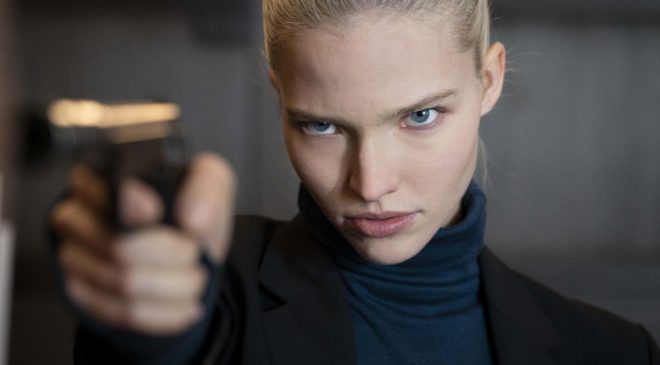
In the 1990’s, a young Russian woman, Anna (model Sasha Luss) is recruited into the KGB by Alek Tchenkov (Luke Evans) to work as an assassin; her new boss, a handler named Olga (Helen Mirren), promises that if Anna works for her for five years she will earn her freedom and escape the desolate life she’s currently leading. Tasked with committing acts of death and destruction, Anna becomes Olga’s prized recruit, although Olga’s boss, KGB head Vassiliev (Eric Godon) seems to think she’ll never escape the clutches of Russia’s secret organisation. So when Anna is interrupted mid-kill by CIA Agent Miller (Cillian Murphy), who offers her another way out so long as she works for him, the young assassin is torn between competing government agencies and the nightmare of never being free to live her own life.
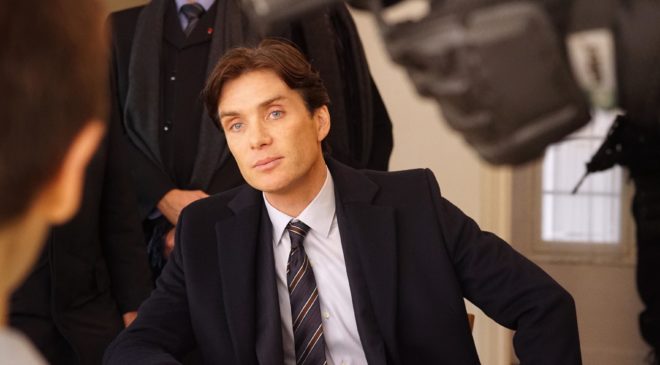
If Red Sparrow taught us anything, it is that grungy period action spy films such as this are really, really difficult to pull off well. Besson, try as he might, fails. Anna is a middling, inert affair, with competent actors surrounding the (admittedly gorgeous) iniquitous thespian skills of Sasha Luss to prop up this weak-willed double-cross effort. Hoary cliches of the genre rear their heads, the furiously edited action sequences feel adrift somewhere between The Bourne Supremacy and John Wick Chapter 3, and although the production design is faultless and the technical aspects of the film are a highlight, with a story this insufficient and a leading actress unable to transcend the dire material Anna wallows in what might have been. Besson taps into his Nikita well again with the title character, making her a Poor Unfortunate Soul trapped into the world of assassination, espionage and state secrets combating behind closed doors and away from the public eye; you can see he’s found a new muse in Luss, who looks strangely like Besson’s former wife and old muse, Milla Jovovich if you squint enough, and giving such a role to a underdeveloped performer proves to be a risky proposition indeed. Besson obviously scouted her from her small part in his previous film, Valerian, but taking Luss from a minor role and giving her the lead, having to shoulder the burden of the thin story, trope-ridden character and Besson’s gleefully pornographic camerawork, hamstrings the film’s notion of excitement or, dare I say it, entertainment.
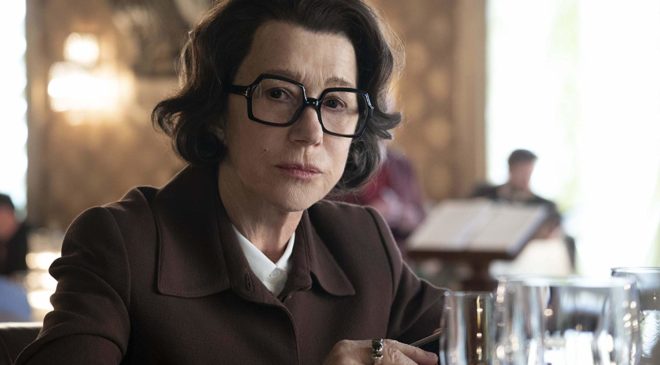
Anna is what you might get if the violence of Red Sparrow and the abandonment of sense and reason of The Fifth Element’s Fhloston Paradise sequence screwed and produced a malformed child. It’s not what you might call a pleasant film – it starts with Anna being the subject of domestic abuse, for a start, which might rancour some given the nature of recent claims against Besson – and the balance between realism and cartoonish hyperviolence never coalesces into anything legitimately exciting. A fight sequence inside a fancy restaurant between Anna and a legion of faceless henchmen and bodyguards, in which the young woman completely slays, must surely appeal to teenage boys who still think The Matrix Reloaded was the greatest film ever made, but for all its bloodthirsty body slamming and gunplay, you never really get swept up in the tension or risk of it all. Luss’s physicality is exceptional, make no mistake, and on its own the scene might become a classic of its kind in time, but mixed into the anaemic film surrounding it there will be very few who seek it out to rewatch.
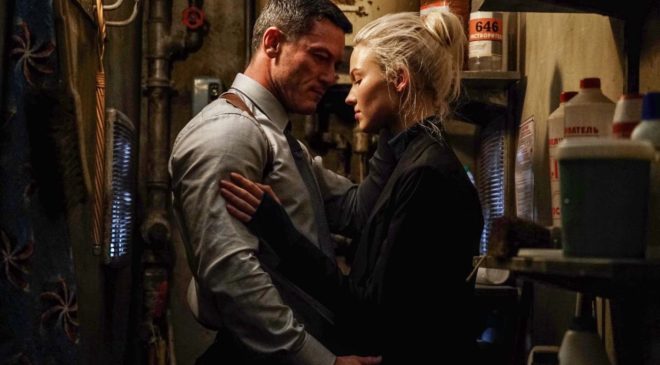
With Luss’ inexperience before the film camera obvious, it’s up to the likes of name stars Helen Mirren and Luke Evans to hold the audience’s attention with stuff like exposition. Mirren acquits herself rather well, having made a mini-career out of smallish, affected supporting roles in B-movies like this, and watching her glare across the screen with a weird Russian accent is always a joy. Evans, meanwhile, isn’t. I’m still not quite sure what his role was meant to bring to the movie other than simply another subplot for Besson to “cleverly” mix into the story, but his character is a bland, joyless succubus of indifference. Lera Abova plays Anna’s innocent girlfriend/partner/lover Maud, in a role that had potential initially but sputters out quite quickly, and one scene in particular had her looking as confused as I was that she was even in the film at all. Then there’s Cillian Murphy, absolutely killing it as CIA agent Miller; Murphy always brings his A-game to even the most terrible of material, and Anna is no exception. As Miller, Murphy manages to eke out some kind of hidden backstory for the role, a sense of history behind his eyes that stretch beyond the film frame and Besson’s terrible writing, and aligned with Mirren forming a double-act of mirror-image roles, he’s quite good.
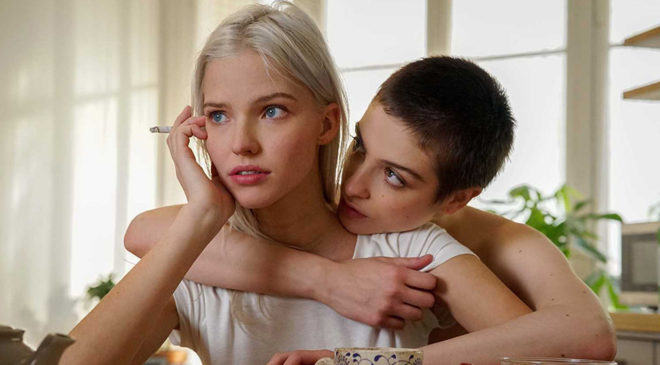
Anna is a film stuck inside Luc Besson’s head wanting desperately to be relevant again. It’s a story without particular note, a concept done far better not just by other filmmakers but by Besson himself in the past, and one senses that this film’s mediocrity underscores a far more serious problem with the director’s recent output. As Valerian proved, when he’s able to create a limitless fantasy world in space, there’s almost none better (except maybe George Lucas). When he’s grounded on an Earth, however, with humans and human problems, the traction slips and the ride veers off course. Anna lunges into self-parody a touch too often and although aided by the grand work of Eric Serra (music) and Thierry Arbogast (cinematography), the directorial flourishes of the film aren’t enough to capture the vintage magic Besson hoped to deliver.

